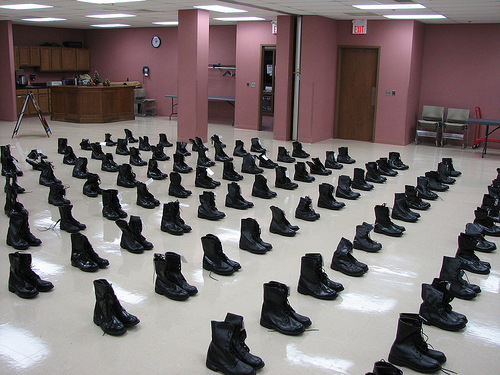In the 10 years since the U.S. invasion of Iraq, interest in the collections at Chicago’s Pritzker Military Library has grown, even if the media are paying less attention to the story.
Teri Embrey, chief librarian, said the collection has especially grown over the last few years because veterans have been able to distance themselves from the war and have become more comfortable talking about their experiences.
The library’s collection includes books written on individual’s experiences in the war as well as authors coming to the library and speaking about their experiences.
The library is a focal point for students, veterans, and history buffs looking for books and information on the Iraq war.

March 19th marked the 10-year anniversary of the United State’s invasion of Iraq in search of nuclear weapons. Although there were not any nuclear weapons found, the war has continued.
When the war first began in 2003, many people were still feeling the aftermath of the Sept. 11 terrorist attacks, and the invasion of Iraq became a hot-button topic.
Ten years later, is the Iraqi war still on people’s minds? Have opinions changed now that nearly 5,000 American troops and more than an estimated 160,00 Iraqis have been killed.
Mark Stanek, 48, a physician assistant, said the war went on too long.
“I just think it’s been too long,” Stanek said. “At first after 9/11 I think most people felt that justice needed to be served. At that point I was definitely for it.”
Others have stayed true to their initial opinion.
Joyce Freeman, 63, never supported the war. “I really didn’t keep [up] with the war against Iraq when it started,” Freeman said. “I just knew the United States had decided to go to war with Iraq. I just know that I was against then and I’m against now because I personally do not believe in war and violence.”
Although the media have not been covering the war as much as it did in 2003, it has still managed to affect how some look at the war.
Ben Meyer, a 29-year-old attorney, adamantly opposed the war from the beginning. He said that too many innocent civilians were hurt. “We heard stories about people being injured in raids that U.S. soldiers were doing in Iraq,” he said. “We heard stories about soldiers bursting into apartments in the middle of the night and arresting the head of the family in front of their children.”
Richard Prodans, 47, a manager who originally supported the war said he has since changed his mind. “I’ve heard some recent articles that the situation is very bleak for some of the people there.” Prodans said, “It’s a tough road for the people that are there.”
Thousands of Iraqis are now living in the United States, including cities like Chicago, as political refugees.
The Iraqi Mutual Aid Society is one of the organizations helping them find work. Joshua Tyack, employment services director at the society, said he helps the Iraqis without commenting on the war.
“I really don’t have any views of the war, and I don’t get involved in it,” he said.
Tyack said Iraqis have not faced any particular trouble finding work because of where they come from.
“I personally feel as though there is no stigma or struggle for Iraqis to gain jobs like everyone else,” he said. “I believe that it’s the same for every refugee when they are trying to gain employment. It’s hard for everyone to gain jobs for employment everywhere you go and whoever you are.”
Madeline Reynolds and Glenn Minnis contributed to this story













Be First to Comment